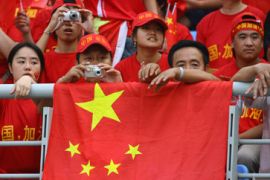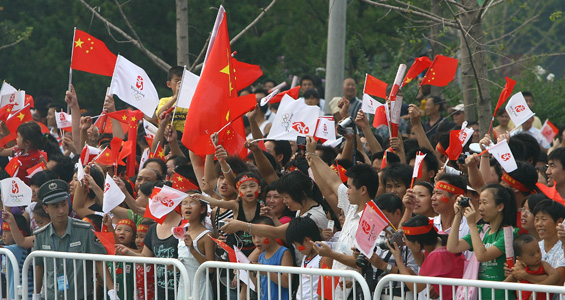In Canada, China is champion
Chinese Canadians choose which country to cheer for at the Olympics.

 |
| Chinese Canadians have to choose between cheering on their homeland or their adoptive country [GALLO/GETTY] |
When Beijing and Toronto bid in 2001 for the chance to host the 2008 Olympics, many Torontonians of Chinese descent felt torn between the homeland and their new adopted country.
But since then, and with the opening ceremony of the Beijing 2008 Olympic games just hours away, many Chinese-Canadians know exactly who to cheer for.
Andrea Chun, a lawyer and host of a phone-in show on local Chinese television, said she will be supporting her native home.
“When it comes to the games most Chinese-Canadians are rooting for China, to be honest; they won’t admit it if you ask them, but for sure they are,” she said.
Originally from Hong Kong Martin Lau, who works in the financial services sector, did not hesitate to announce his excitement, even though he has been in Canada for 20 years. “I definitely support the Olympics in China and the Chinese people,” he said.
But there are divided loyalties in a community that makes up the largest non-European ethnic group in Canada, standing at 1,346,510 or 4.3 per cent of the population, according to a 2006 census.
“In a place like Canada, you can root for whoever you associate with,” says Karen Sun, the executive director of Chinese Canadian National (CCNC).
“People here have so many teams to choose from.”
But for some Chinese, who have spent all their lives in Canada, the homeland offers an exciting, yet unfamiliar magnetism.
Evelyn Siu, 25, was born and raised in Toronto and will cheer on the Canadian Olympic team.
“I was proud on behalf of my heritage. I was a little disappointed that Toronto didn’t get it, but I think Beijing was an interesting choice too. I’m going with the Canadians definitely, since I’m not too familiar with Chinese Olympians.”
“Coming-out party”
But many Chinese are finding their country increasingly under the spotlight, and not necessarily because of its preparations to host the games or the abilities of their athletes.
In recent weeks, international media has focused on alleged human rights abuses, treatment of minorities and the predominantly Muslim Uighurs, media and internet censorship, economic prosperity, and pollution in China.
Chinese-Canadians, however, believe the games should be viewed as a chance to showcase the country’s position and its ability to change and be embraced by the rest of the world.
“It’s really a coming out party,” Chun said.
“People are very proud and very nationalistic. Even the Tibet riots were overshadowed by this pride. For the Chinese, at this point they are willing to overlook anything, including rule of law, human rights, and social problems.”
Positive effect
However, Chun believes the Olympic games are also forcing the Chinese to reflect about the rest of the world and what role they can play on an international scale.
In an incident reported in Canadian media, four journalists were roughed up for filming an altercation in Beijing. The following day, Chinese authorities said the journalists should not have been harassed or interfered with.
“It’s because the mentality is that you can’t film negative news,” Chun said.
“The authorities’ reaction is already a step [forward], though I am not optimistic about things changing very quickly.”
Victor Wong of the CCNC believes that change will happen in China, but incrementally.
“There is always something negative if you look for it – air pollution, lack of freedom of access to the internet, human rights concerns, congestion – it depends whether you want to take a longer term view,” he said.
“The question is; will the event contribute to the development of China in the long run?”
Tibet
Dermod Travis, the executive director of the Canada-Tibet Committee (CTC), remains very sceptical that China is changing.
He believes that recent reports of censorship and repression of dissent emerging from China have demonstrated that the International Olympic Committee (IOC) made an error in judgment when it awarded Beijing the games.
The Committee had hoped giving Beijing the chance to host the games would improve its human rights record.
“What we have seen is the exact opposite,” Travis said.
“For example, China blocked websites for journalists when the media was promised full access and it placed Chinese dissidents under house arrest.”
The CTC is on record saying that Beijing has the right to host the games, and that their differences remain with the policies of the government, rather than the Chinese people.
Travis, however, believes that the games have exposed China’s repressive policies.
“We recognise that the games are allowing the world to see China for what it truly is – a country that cannot keep its word and is prepared to continue to use whatever means are required to suppress its own citizens,” he said.
Chun also believes that China should recognise and address its human rights record.
She believes the dissent in Tibet could have been better handled by the authorities.
“Tibet is only a fraction of the problem. China has to let the world see it for what it is … if China thinks the [protestors in Tibet] were rioters, they should just let the media in, to see for themselves.”
Meanwhile, away from the political arguments, Rich Chan, a 22-year-old personal trainer who has been in Canada his whole life, says the Olympics are a chance to highlight diversity and acceptance of all spectrums and ethnicities in China.
But he says he knows who he will be supporting at the games.
“I’m going with China. China all the way.”